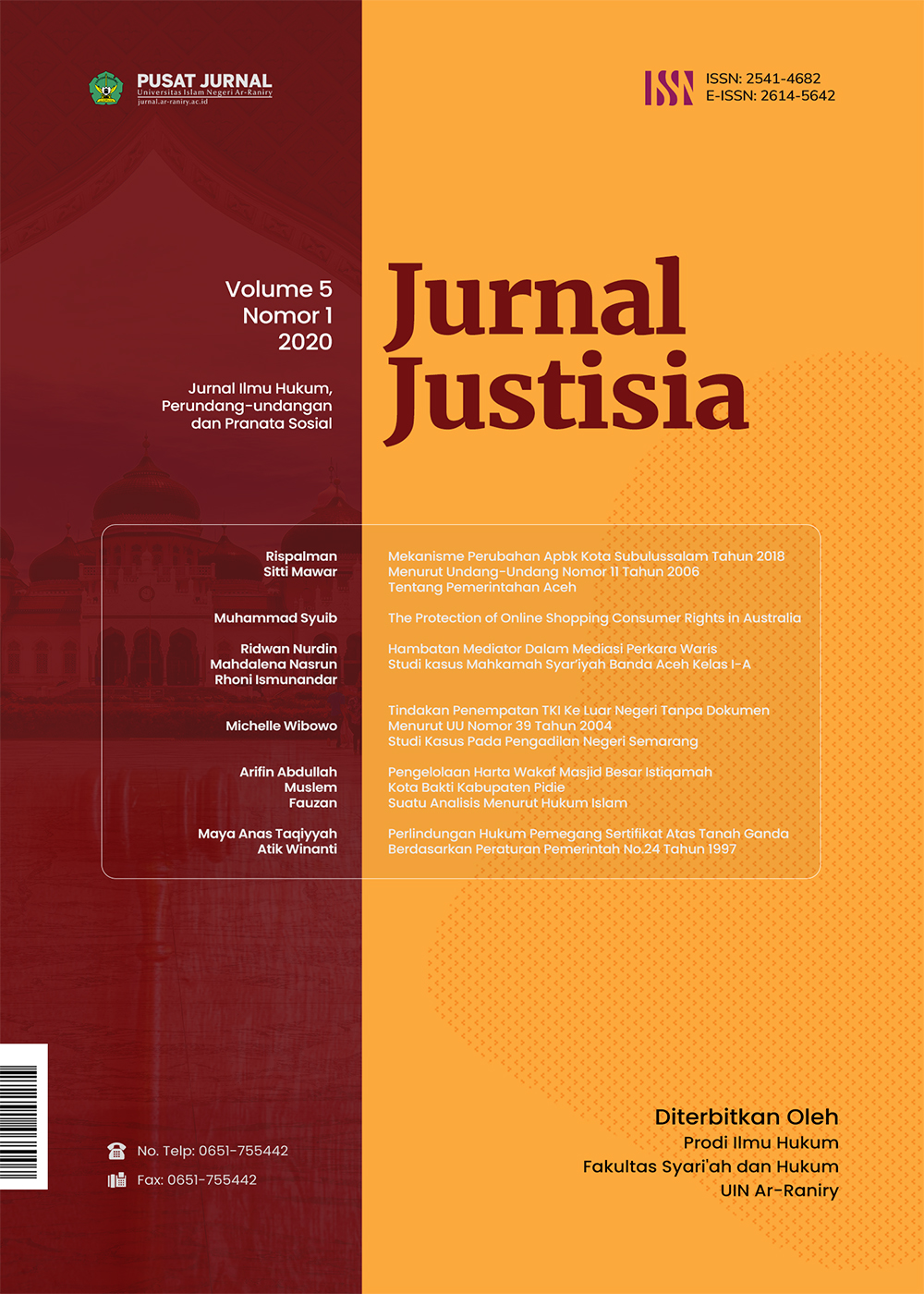The Protection of Online Shopping Consumer Rights in Australia
DOI:
https://doi.org/10.22373/justisia.v5i1.7268Abstract
As one of the advanced countries in the world, Australia is putting technology as main instrument in dealing with daily activity, included in shopping. Therefore, nowadasys, many Australian rely on online shopping. It seems everything becomes easier when it is dealt online. People do not need to go outside their home and spend their money. What they can merely need is just sit at home and wait for the order. Thus, online shopping can be argued is more effective and efficient in this era. However, beyond this positive aspect, there are also some negative aspects. Among them is the quality of the product. Buyers (consumers) would never see goods or services directly. They only view the products or services through pictures or videos which are available on the website. The problem is, these images and videos might not be as good as reality. The vendors post the high quality pictures and videos on the site merely to attract consumers. Another issue is, difficult to communicate with the seller after buying the product. During the negotiation, it is easy to contact seller, but after the products are sold, majority vendors would “disappear”. Security payment is among on the risk list as well. Therefore, it is interesting to be researched, how the Australian law then protects its society from such risk. The Government claims that the Australian Competition and Consumer (ACC) Act 2010 has become law umbrella in protecting Australian in dealing with online shopping.References
A. Articles / Books / Reports
Bruce, Alex, Consumer protection law in Australia, (LexisNexis, 2nd edition, 2014)
D Miyazaki Anthony and Ana Fernandez, ‘Consumer Perceptions of Privacy and Security Risks for Online Shopping’ (2001), Journal of Consumer Affairs 27, 35 <http://onlinelibrary.wiley.com/doi/10.1111/j.1745-6606.2001.tb00101.x/abstract>.
Griffiths, John, ‘Application of the Australian Consumer Law to Government Commercial Activities’ (2015) 29 (3) Commercial Law Quarterly, 3-15 <http://search.informit.com.au/fullText;dn=648934620425062;res=IELAPA>.
G. Smith, Russel and Alice Hutchings, ‘Identity Crime and Misuse in Australia: Results of the 2013 Online Survey’ (Research and Public Policy Series 128, Australian Institute of Criminology, 2014) <http://aic.gov.au/media_library/publications/rpp/128/rpp128.pdf>
G. Smith, Russell, Deceptive and Misleading On-Line Advertising and Business Practices (2000) Australian Institute of Criminology
<http://www.aic.gov.au/media_library/conferences/other/smith_russell/2000-10-crf.pdf>
Justin, Malbon, ‘Online Cross-Border Consumer Transactions: A Proposal for Developing Fair Standard Form Contract Terms’ (2013) 37(1) UWALawRw 20,
<http://www.austlii.edu.au/au/journals/UWALawRw/2013/3.html>
McDonald, Brien, ‘NAB Online Retail Sales Index: February 2016’ (Monthly Update Report, National Australia Bank, 30 March 2016) <http://business.nab.com.au/nab-online-retail-sales-index-march-2015-16054/>.
Morgan, Roy, ‘Online Shopping on the Rise for More Retail Categories’ (Press Release, 6095, 19 March 2015) <http://www.roymorgan.com/findings/6095-online-shopping-on-rise-201503182332>
Sands, Rosanne, ‘Google v ACCC: The High Court Considers Misleading and Deceptive Conduct’ (2013) 15 University of Notre Dame Australia Law Review 152-165, 163 <http://search.informit.com.au/documentSummary;dn=268417767580236;res=IELAPA>
B. Cases
ACCC v Valve Corporation (No 3) [2016] FCA 196
Australian Competition and Consumer Commission (Accc) V Scoopon Pty Ltd
Butcher v Lachlan Elder Realty Pty Limited (2004) 218 CLR 592, 109
Campbell v Backoffice Investment Pty Ltd (2009) 238 CLR 304
Google v ACCC (2013) HCA
C. Legislations
Australia Competition and Consumer Act 2010 (Cth)
D. Websites
ABC News
Australia Competition and Consumer Commission
Australian Contract Law
Australian Institute of Criminology
Australian Securities and Investment Commission
Downloads
Published
Issue
Section
License
The Authors submitting a manuscript do so on the understanding that if accepted for publication, copyright of the article shall be assigned to Jurnal Justisia : Jurnal Ilmu Hukum, Perundang-undangan dan Pranata Sosial, Ar-Raniry State Islamic University, Indonesia as the publisher of the journal.
Jurnal Justisia : Jurnal Ilmu Hukum, Perundang-undangan dan Pranata Sosial right of first publication with the work simultaneously licensed under Creative Commons Attribution-ShareAlike 4.0 International License (CC BY-SA 4.0) that allows others to share (copy and redistribute the material in any medium or format) and adapt (remix, transform, and build upon the material) the work for any purpose, even commercially with an acknowledgment of the work's authorship and initial publication in Jurnal Justisia : Jurnal Ilmu Hukum, Perundang-undangan dan Pranata Sosial. Authors are able to enter into separate, additional contractual arrangements for the non-exclusive distribution of the journal's published version of the work (e.g., post it to an institutional repository or publish it in a book), with an acknowledgment of its initial publication in Jurnal Justisia : Jurnal Ilmu Hukum, Perundang-undangan dan Pranata Sosial. Authors are permitted and encouraged to post their work online (e.g., in institutional repositories or on their website) prior to and during the submission process, as it can lead to productive exchanges, as well as earlier and greater citation of published work (See The Effect of Open Access).

